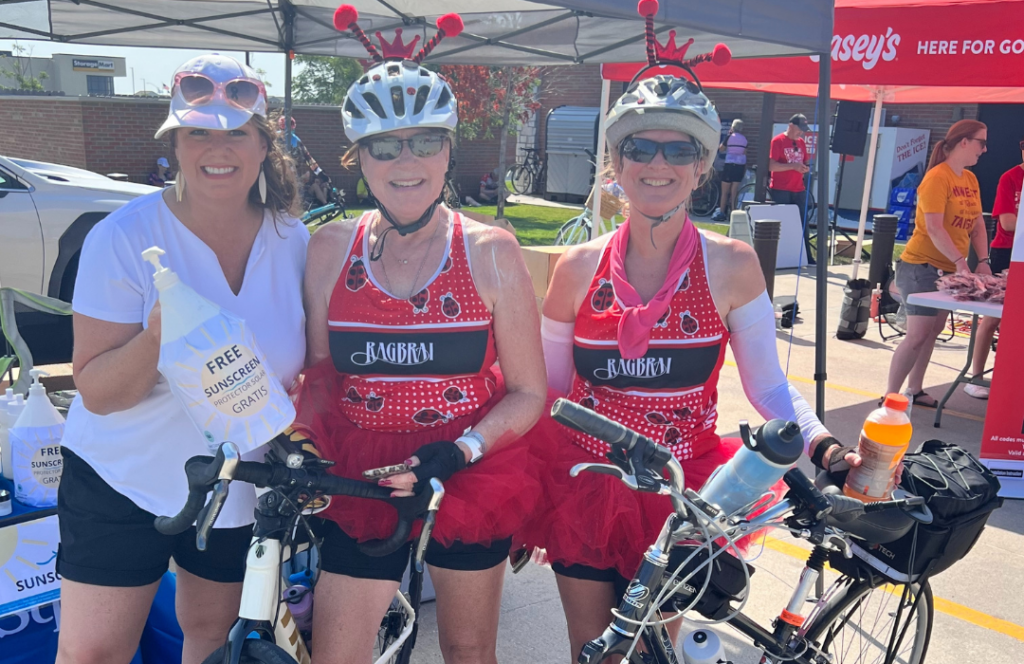
GRANTS
Want to collaborate to reduce the burden of cancer?
The Iowa Cancer Consortium periodically offers funding and partnership opportunities to support the goals and strategies outlined within the Iowa Cancer Plan.
Funding Opportunities
Annually, the Iowa Cancer Consortium Board of Directors call for projects in support of the Iowa Cancer Plan. The Invitation for Proposals (IFP) process is typically released in early-spring and intends to fund as many collaborative projects which address identified gaps in Iowa’s cancer control efforts as possible. Applicants may typically apply for up to $25,000 annually. However, it is important to note that the Iowa Cancer Consortium receives funding from the Iowa Department of Health and Human Services to award and manage community grants. The amount of funding awarded to grantees from year to year is subject to change. To receive notification about these opportunities, join our email list here.
Open Applications:
Consider this!
The Iowa Cancer Consortium (including staff, members, and partners) contains cancer prevention and control experts from within and outside Iowa. And all of them are seeking to connect with new and sometimes unlikely partners who want to make bigger impacts with their work and resources. Community members are encouraged to contact the Iowa Cancer Consortium staff to discuss their project ideas and get connected to other members across the state who might be interested in similar initiatives. Contact us at [email protected].
Currently funded projects (FY25)
- Above + Beyond Cancer: Optimal Living Outreach Program
With the support of the Iowa Cancer Consortium, Above + Beyond Cancer will enhance their Optimal Living Program by addressing health equity and focusing on rurality, diversity, and inclusion. With the help of a consultant and trusted community partners, Above + Beyond Cancer will deliberately reach out to underrepresented populations in Iowa and ensure that their survivorship programming is accessible to all. Classes include indoor cycling, yoga, small group personal training, Tai Chi, individual coaching, pole walking, aquatics, cooking classes, book club, and meditation. - Cancer Support Community Iowa & NW Illinois at Gilda’s Club: Enhancing Psychosocial Support for Cancer Survivors
Through this grant, Cancer Support Community Iowa & NW Illinois at Gilda’s Club will partner with hospitals and cancer centers across Iowa to expand its easily accessible virtual and online psychosocial support programming statewide. Licensed mental health professionals affiliated with Gilda’s Club will deliver three programs as part of this project: Connecting Through Cancer, a weekly virtual support group for cancer survivors; Friends and Family Group, a weekly virtual support group for friends, family, and caregivers impacted by cancer; and bimonthly Educational Workshops that offer new skills, information, and techniques for living with cancer. Topics may include diagnoses, treatments, physical side effects, survivorship challenges, insurance, finances, legal issues, and nutrition. - Great River Health: Enhancing Psychosocial Support for Cancer Survivors
With funding from the Iowa Cancer Consortium, Great River Health will implement a minimum of two, nine-week pilot A Time to Heal Survivorship 101 workshops for cancer survivors and caregivers in southeast Iowa at the Southeast Iowa Regional Medical Center in West Burlington. Each week of the nine-week program, cancer survivors (defined as patients completing their cancer treatment) will learn from trained/certified facilitators to regain physical, emotional, intellectual, psychological, and spiritual strength after undergoing treatment for cancer. Survivorship topics including: nutrition, exercise, relaxation, sexual functioning, and more. Within a supportive environment, these sessions will also enable peer-to-peer networking opportunities for patients and caregivers in the program. Existing evidence suggests that participants will improve their quality of life, happiness, resilience, hope, and emotional wellbeing. - MercyOne Waterloo Cancer Center: Cancer Center Food Pantry
In partnership with the Northeast Iowa Food Bank, MercyOne Waterloo Cancer Center will open a food pantry on site, conduct a food insecurity screening for every cancer center patient, and provide non-perishable food and fresh produce to patients and their households who need assistance. Patients will also be connected with a social worker to help them navigate a variety of barriers and create short- and long-term strategies to address their food insecurity issues and a multi-disciplinary team (physicians, social workers, nurses, and dieticians) will create a food intervention for each patient tailored to their individual needs, cancer diagnosis, treatment, and dietary restrictions. - One Iowa: LGBTQ+ Inclusivity Training for Cancer Providers
One Iowa will provide free LGBTQ+ Inclusivity Training courses to cancer providers in Iowa, equipping providers with best practices when serving LGBTQ+ patients and giving them the necessary tools to advocate for their LGBTQ+ patients in the healthcare setting. One Iowa can also provide consultations to organizations to review their intake practices and paperwork, with the goal of making their organization more accessible to LGBTQ+ individuals seeking care and supporting systems change over time. Trained providers can be added to One Iowa’s LGBTQ+ Online Resource Guide where community members can search for One Iowa-trained providers in their area. This project will help reduce the health inequities faced by the LGBTQ+ community in seeking cancer care or screenings and simultaneously connect community members to local providers trained with their needs in mind. - Promise Community Health Center: Lung & Oral Cancer Equity Initiative: Bridging Disparities in Northwest Iowa
Promise Community Health Center is a federally-qualified health center (FQHC) in Sioux Center, IA. This funded project will address rising rates of lung and oral cancer in Northwest Iowa, with a priority of reducing health disparities for populations who are uninsured, low-income, minorities, non-English speaking, and recent immigrants. It will focus on smoking, vaping, and chewing tobacco cessation, as well as strategies to improve screening, education, referrals, HPV vaccination, low-dose CT screening, and collaboration in the community.
INTERESTED IN LEARNING MORE?
We are eager to connect you with information about resources and contacts appropriate to your needs. Drop us a line and we will be in contact shortly.
